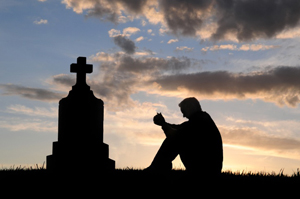 Imagine losing someone very close to you; perhaps your partner dies. How might you feel and behave in the weeks following this death? You might feel a sense of sadness and emptiness so intense that it is difficult to hold back tears. Perhaps you would have little interest in activities that you usually enjoy. Maybe you would find it difficult to sleep after sharing a bed with your partner for so many years. You might begin eating more or less and either gain or lose a significant amount of weight. It might be difficult to concentrate on your work. You might be preoccupied with a sense of guilt, wondering whether you could have done something to prevent your partner’s death. You might even wish for the day that you and your partner are reunited in death.
Imagine losing someone very close to you; perhaps your partner dies. How might you feel and behave in the weeks following this death? You might feel a sense of sadness and emptiness so intense that it is difficult to hold back tears. Perhaps you would have little interest in activities that you usually enjoy. Maybe you would find it difficult to sleep after sharing a bed with your partner for so many years. You might begin eating more or less and either gain or lose a significant amount of weight. It might be difficult to concentrate on your work. You might be preoccupied with a sense of guilt, wondering whether you could have done something to prevent your partner’s death. You might even wish for the day that you and your partner are reunited in death.
These kinds of feelings and behaviors, while certainly difficult, probably seem like pretty normal and appropriate responses to a significant loss. They certainly don’t seem indicative of a diagnosable mental illness, right? Well, until the fifth version of the Diagnostic and Statistical Manual of Mental Disorders (DSM-V) is released in May, your hunch is correct. Currently, these feelings and behaviors aren’t considered evidence of mental illness.
In order to meet the diagnostic criteria for major depressive disorder (MDD), five out of nine specific symptoms must be exhibited, more often than not, for two weeks or longer, and they must impair your ability to function. The example above actually includes seven of the nine symptoms of MDD. These symptoms would probably be present much of the day for several weeks and would certainly impair normal functioning.
Currently, however, there is an exemption for bereavement in the diagnostic criteria that allows for such symptoms to persist for up to two months after the death of a loved one. Only after two months of persistent and pervasive depressive symptoms can a diagnosis of MDD be made in the context of bereavement. This exemption acknowledges that while grieving can look and feel virtually identical to depression, it is, quite simply, not depression. Unfortunately, the new version of the DSM will remove the bereavement exemption from the diagnostic criteria, and come May, the very appropriate reaction to the death of a loved one described above will be pathologized and diagnosed as MDD.
The world looks to the field of psychology to understand normal versus abnormal behavior, and the field of psychology uses the DSM as its guide for drawing the often fine line between what is normal and abnormal. This is a responsibility that should not be taken lightly. Labeling someone as mentally ill has significant implications. In the best case, a person who receives a diagnosis is given a lens through which to better understand himself or herself. It can be deeply empowering for someone to understand that the thoughts, feelings, and behaviors that have plagued him or her have a name, and that there are not only treatment options, but hope as well—hope for healing, hope for growth, and hope to become the person he or she has always wanted to be.
However, in cases where a perfectly healthy person is labeled as mentally ill, the implications can be devastating—just ask the gay man who was considered mentally ill in the early 1970s before homosexuality was removed from the DSM. To be labeled as sick, to be pathologized, for being who you are, or for being appropriately devastated by the loss of a loved one, serves no purpose and may be quite harmful.
Imagine being told that the anguish you are feeling over the loss of your partner means that you are mentally ill. Is there any way that this could be helpful, or would it just serve to make you feel much more lost and hopeless? What would it be like if a doctor suggested you take medication? Imagine being told to take a pill to get over the death of a loved one. Should you find yourself in a therapist’s office grieving the loss of a loved one and your therapist suggests a diagnosis of MDD, don’t be so quick to accept the label—it is entirely possible that you are simply, and appropriately, grieving.

The preceding article was solely written by the author named above. Any views and opinions expressed are not necessarily shared by GoodTherapy.org. Questions or concerns about the preceding article can be directed to the author or posted as a comment below.

 Fighting Loneliness Begins with You
Fighting Loneliness Begins with You Dependent Nation: How the DSM-V Perpetuates the Issues It Describes
Dependent Nation: How the DSM-V Perpetuates the Issues It Describes Not a Fan of the DSM-V ... or Its Predecessors
Not a Fan of the DSM-V ... or Its Predecessors

